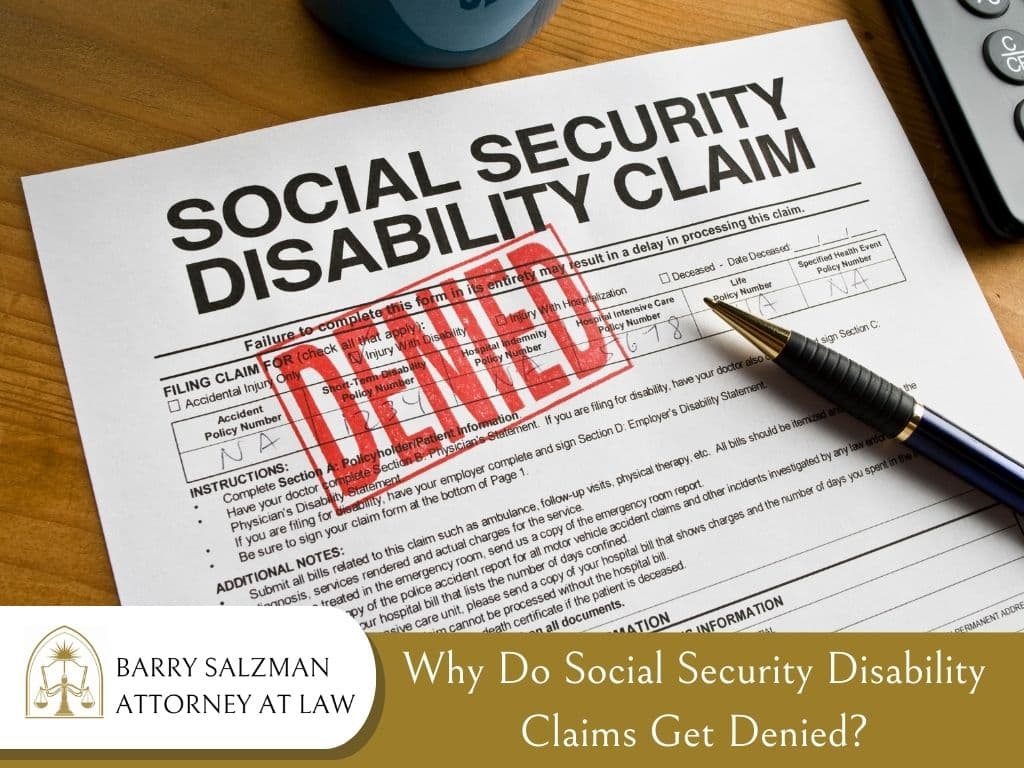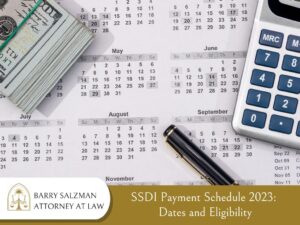Why Do Social Security Disability Claims Get Denied?

Trying to navigate your way through the disability claims process can be frustrating. The following information is offered to help you decide whether you have a claim to make and to assist you if your claim has been denied.
You will find it very helpful to have legal assistance to help you navigate your way through this process.
How Does Social Security Disability Work?
The Social Security Administration (SSA) administers two primary disability programs: Disability Insurance Benefits (DIB) and Supplemental Security Income (SSI). DIB requires that you have paid social security taxes on earned income for a sufficient period of years to be considered “insured” for benefits. DIB also includes auxiliary benefits for children when you become disabled, benefits for your survivors, and benefits for certain disabled children. SSI is a welfare benefit that requires proof that your financial resources are very limited and evidence that you are disabled.

At the outset, you should understand how the SSA determines whether you are disabled. SSA must first determine if you are eligible for either DIB or SSI. Eligibility information is provided below. If you are eligible, SSA then determines whether you are disabled based on a 5-step evaluation process.
- First, you must not have engaged in substantial gainful employment since you say you became disabled (earned income in excess of $1,350/month).
- Second, you must have medical evidence of one more diagnosed conditions that represent a “severe impairment”, defined as any medical condition that affects the physical and/or mental requirements for basic work activity.
- Third, SSA must determine whether you have a medical condition that meets certain prescribed criteria referred to as the “Medical Listings” which determine whether you may be considered disabled solely based on the severity of your medical condition (if you meet such criteria, you are automatically considered disabled.
- Fourth, if your condition doesn’t meet a listing, SSA must determine the extent of your “residual functional capacity (RFC)” (that is what you are capable of doing despite your medical impairments).
- Fifth, SSA must determine whether you have the remaining ability to perform any of the jobs you have performed over the past 15 years and, if not, whether there is other work you remain capable of performing.
This determination is dependent on your age as it is more difficult to establish a disability under the age of 50 and easier to do so at age 50 and above.
Who’s Eligible for Social Security Disability?

SSI is available for children and adults regardless of earnings credits. The standard of disability for children is different from the standard applied for adults.
You are considered “insured” for DIB:
- If you are below age 24 and have at least 6 earnings credits in the 3-year period before you became disabled;
- If you are between age 24 and before age 31 and have credits for half the years between age 21 and the date you became disabled;
- And if you are age 31 you need 5 years of credits in the 10-year period before you became disabled.
- You must also establish that you have not been engaged in “substantial gainful activity” after you became disabled.
Why a Claim May Be Denied?

Broadly speaking, claims are denied if (1) you are not eligible for benefits due to lack of earnings credits (DIB), you have excess financial resources (SSI), or are engaged in substantial gainful activity, and (2) you lack sufficient evidence to prove you are disabled. Proof of disability requires evidence that you have one or more medically determinable conditions (physical or mental) that can be considered a “severe impairment” and prevents you from performing your past work or any other work for which you remain capable of performing.
Top 10 Reasons Why Social Security Disability Claims Are Denied
- You don’t have enough earnings credits to qualify for disability insurance benefits. In other words, you haven’t paid into the social security system long enough to be insured for benefits (this only applies to disability insurance claims, not Supplemental Security Income (SSI)).
- You are currently earning too much money to be eligible for benefits.
- You don’t have sufficient medical evidence to support your claim.
- You failed to complete disability questionnaires.
- You failed to appear for a medical examination when asked.
- Your medical records contradict your allegations about the severity of your physical or mental problems.
- Although you can’t perform your usual job, you retain the ability to perform other work.
- You continue to abuse drugs or alcohol and have not stopped.
- You failed to appear for your disability hearing.
- You failed to appeal a denied claim within the appeal period.
What Should You Do if Your Claim Is Denied?

The most important thing you can do is seek counsel with a qualified social security disability attorney to determine whether you have a justifiable basis for appeal. Your attorney can explain why your claim was denied and what evidence you need for a successful appeal.
How Does the Social Security Appeals Process Work?
You have 60 days to appeal the initial denial of your claim. This is called a request for reconsideration. If reconsideration of your claim is denied, you have 60 days to request a hearing before an Administrative Law Judge. If the judge denies your claim, you have 60 days to request a review by the SSA Appeals Council. If the Appeals Council denies your request for review, you have 60 days to file suit in federal court to review the final action of SSA in denying your claim.
How Many Times Can You Appeal a Denied Claim?
As noted above, after the initial denial of your claim, you have 4 “appeals”. If you fail to appeal within the appeal period, you may be able to refile your claim in some circumstances.
What Are Your Chances of Winning a Denied Claim?

Nationally, about 50% of the cases that are appealed to the hearing level with an Administrative Law Judge result in benefits paid. Whether your case will be successful depends almost entirely on the strength of the medical and other evidence that supports your claim. Your lawyer is best able to make that determination.
The Bottom Line
You should seek legal advice and assistance as early as possible if you wish to file a disability claim. If you find this article very helpful, schedule a consultation with Attorney Barry Salzman today or call (727) 334-7547 for legal assistance and to help you navigate your way through the social security disability claim process.
Schedule Your Consultation Today
Navigating the bureaucracy of any disability program is complex and frustrating and often ends in denial.
Don't do it alone! Have a dedicated, experienced advocate on your team.
Fill out the form below or give us a call at 727-321-4993.



